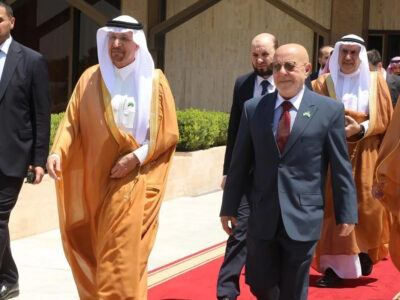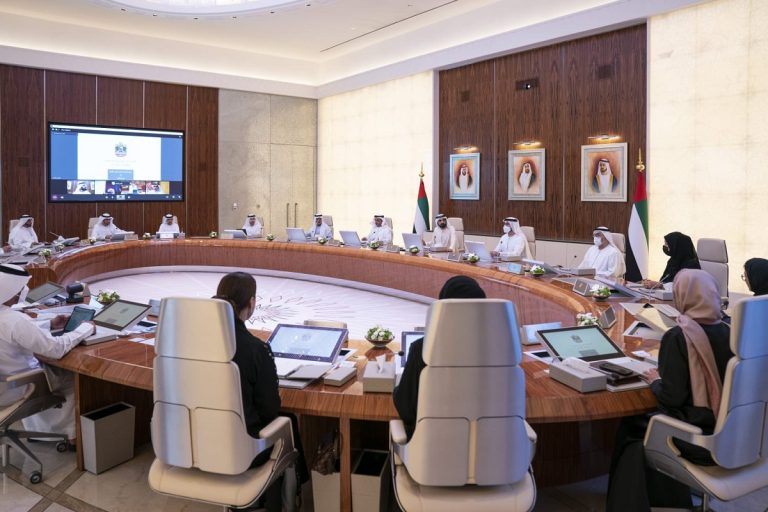The UAE Cabinet has formed a Council for Digital Economy as part of its adoption of the UAE Digital Economy Strategy during a meeting chaired by Sheikh Mohammed bin Rashid Al Maktoum, the Vice President, Prime Minister and Ruler of Dubai.
The UAE Cabinet meeting, which was held at Qasr Al Watan Abu Dhabi, approved a number of initiatives, strategies, and legislations aimed at further developing government work.
Sheikh Mohammed bin Rashid Al Maktoum, said: “Our goal is to increase the contribution of the digital economy sector to the non-oil GDP by 20 percent over the next 10 years. We formed a Council for Digital Economy chaired by Omar bin Sultan Al Olama, the UAE Minister of State for Artificial Intelligence, Digital Economy, and Teleworking Applications.”
The digital economy currently contributes 9.7 percent to the UAE’s GDP, and 11.7 percent to the non-oil GDP.
The UAE Council for Digital Economy will support ambitions to double the contribution of the digital economy to the UAE’s GDP from 9.7 percent in 2021 to 19.4 percent by 2031. It also aims to enhance the position of the UAE a hub for digital economy in the region and globally.
The UAE Digital Economy Strategy includes more than 30 initiatives and programmes targeting six sectors and five new areas of growth.
It aims to define the digital economy in the country with a unified mechanism to measure its growth, while measuring key indicators periodically.
The strategy will define the priorities of the digital economy in the country, ensuring the contribution of all other economic sectors.
The UAE Cabinet meeting was also attended by Sheikh Maktoum bin Mohammed bin Rashid Al Maktoum, the Deputy Ruler of Dubai, Deputy Prime Minister, and Minister of Finance, as well as Lt General Sheikh Saif bin Zayed Al Nahyan, the Deputy Prime Minister and Minister of the Interior.
During the meeting, the UAE Cabinet also adopted a number of international agreements, including an agreement to link the payment systems of the GCC countries. The Cabinet also approved the country’s accession to the International Partnership for Hydrogen and Fuel Cells in the Economy.
The cabinet also approved a federal law on public finance, which obligates federal authorities to coordinate with the Ministry of Finance to achieve the financial strategy’s objectives as approved by the Cabinet.
UAE Cabinet adopts laws, initiatives on humanitarian work, private schools, and family counselling
The UAE Cabinet also discussed a regulatory framework to support the UAE’s foreign humanitarian work.
This framework approved by the Cabinet, includes the establishment of coordinating offices in the country’s missions abroad for foreign aid. This will help regulate financial transfers to donors and the UAE’s charitable institutions in beneficiary countries.
The framework also includes a guide that organises the seasonal work of all UAE donors concerned with foreign aids, in accordance with international standards, and in line with the UAE foreign aid policy and strategy.
Sheikh Mohammed said: “Our humanitarian work is continuous and the UAE will always remain the capital of generosity and goodness.”
Sheikh Mohammed added: “At the Cabinet meeting, we also adopted unified standards for licensing and encouraging family counseling professions. The goal is to provide families with the best specialists in all family matters.”
Furthermore, the Cabinet also approved executive regulation of the federal decree-law on private education, which aims to regulate the work of private schools in the country in accordance with the objectives of the private education law – the provisions of which apply to all private schools in the UAE.
The executive regulation aims to strengthen a high-level educational system that regulates the licensing mechanism for private schools, to ensure the quality of education, and to place students among the best in the world in knowledge assessment tests.
During the meeting, the Cabinet also adopted new standards for licensing of family therapy professionals, which includes specific criteria and procedures for licensing family counselors and professionals.
The decision constitutes a reference for all parties in evaluating documents, qualifications and experiences of professionals, and ensures that the same unified licensing standards are applied nationwide.
Additionally, the UAE Cabinet adopted a decision to cancel the registration fees in Federal Supplier and Contractor Register, to encourage suppliers to enhance their participation, and increase their registration in the federal government.








